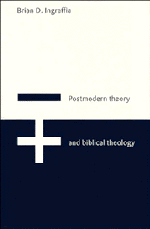Book contents
- Frontmatter
- Contents
- Acknowledgements
- List of abbreviations
- Note on translations of the Bible
- Introduction: postmodernism, ontotheology, and Christianity
- 1 NIETZSCHE'S MOCKERY: THE REJECTION OF TRANSCENDENCE
- II HEIDEGGER'S FORGETTING: THE SECULARIZATION OF BIBLICAL ANTHROPOLOGY
- III DERRIDA'S DENIALS: THE DECONSTRUCTION OF ONTOTHEOLOGY
- Conclusion: ontotheology, negative theology, and the theology of the cross
- Notes
- Bibliography
- Index
Conclusion: ontotheology, negative theology, and the theology of the cross
Published online by Cambridge University Press: 01 June 2011
- Frontmatter
- Contents
- Acknowledgements
- List of abbreviations
- Note on translations of the Bible
- Introduction: postmodernism, ontotheology, and Christianity
- 1 NIETZSCHE'S MOCKERY: THE REJECTION OF TRANSCENDENCE
- II HEIDEGGER'S FORGETTING: THE SECULARIZATION OF BIBLICAL ANTHROPOLOGY
- III DERRIDA'S DENIALS: THE DECONSTRUCTION OF ONTOTHEOLOGY
- Conclusion: ontotheology, negative theology, and the theology of the cross
- Notes
- Bibliography
- Index
Summary
Christian theology must think of God's being in suffering and dying and finally in the death of Jesus, if it is not to surrender itself and lose its identity … the controversy between Christian theology and the philosophical concept of God must now be taken further … the time has finally come for differentiating the Father of Jesus Christ from the God of the pagans and the philosophers (Pascal) in the interest of Christian faith.
Moltmann, The Crucified God: The Cross of Christ as the Foundation and Criticism of Christian TheologyDENIALS: NEGATING/NEGATIVE THEOLOGY
God encounters the soul as “either-or”; and this involves acceptance or rejection, affirmation or denial. (Karl Barth, The Epistle to the Romans)
It is clear that Nietzsche, Heidegger, and Derrida all reject metaphysical theology. I have tried to show that this rejection of metaphysical theology, or ontotheology, implies for each of these thinkers a similar rejection of Christian theology. I have also attempted to demonstrate that biblical theology – Christian theology based upon the revelation of Jesus Christ and articulated through the conceptuality of the Hebraic scriptures – should be distinguished from the Christian theology which these thinkers claim to have revalued, destroyed or deconstructed. Biblical theology can and should be disengaged from ancient and modern ontotheologies.
Kevin Hart, in his recent work on deconstruction and theology, The Trespass of the Sign, argues that negative theology is the only theological discourse which resists deconstruction.
- Type
- Chapter
- Information
- Postmodern Theory and Biblical TheologyVanquishing God's Shadow, pp. 225 - 241Publisher: Cambridge University PressPrint publication year: 1995



